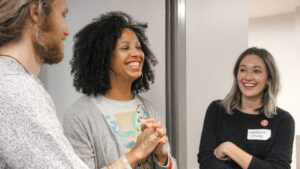Voyage Raleigh Features Jessica Yinka Thomas in Rising Stars Series

Repost from VoyageRaleigh: Raleigh’s Most Inspiring Stories (March 4, 2022)
Today we’d like to introduce you to Jessica Yinka Thomas.
Alright, so thank you so much for sharing your story and insight with our readers. To kick things off, can you tell us a bit about how you got started?
I was born in Miami to a Nigerian economist and an American computer scientist, traveling back and forth between the US, Nigeria, and Senegal as I grew up. For as long as I can remember, I’ve had a singular focus on making the world a better place.
When I worked at LeapFrog, we were so focused on the social impact, creating new interactive and engaging ways to teach kids about math, science, and reading, but we didn’t think about the environmental impact of the millions of toys we were producing. Since then, I moved out to Durham to get an MBA at Duke’s Fuqua School of Business and I’ve been studying different strategies for re-imagining and designing capitalism in a way that uses the power of business as an engine to drive systemic social and environmental change.
Now, I’m on the faculty at NC State’s Poole College of Management. My energy source is the curiosity, drive, talent, and passion of the students I have the opportunity to engage. My hope is that I can inspire them while they are still trying to figure out how they will use business as a force for good.
I’m sure you wouldn’t say it’s been obstacle-free, but so far would you say the journey has been a fairly smooth road?
I like a challenge, so in undergrad, I studied mechanical engineering, art, design, and psychology. My favorite project at Stanford was designing a life-size set of foam building blocks so that kids could create their own worlds, then jump on them.
I’ve had a passion for education ever since I can remember and decided that I would work for a toy company after I graduated. I walked the aisles at Toys R Us and selected a shortlist of companies I thought were doing innovative work, then I cold-called them and pitched myself. The first company I called on the top of my list, LeapFrog, hired me.
LeapFrog was a start-up at the time and I was the second designer, employee #11. I helped grow the company to the third-largest toy company in the US. Along the way, we created dozens of innovative award-winning toys, in six different languages that sold tens of millions of units around the world like the Twist & Shout; Shout Multiplication. I didn’t think about it at the time, but we were very focused on the social impact of the products we were developing but did consider the environmental impacts.
We weren’t talking about designing for disassembly and recycling or what would happen to the millions of products we produced at the end of their life. Since then, I’ve taken a much more holistic perspective of impact, considering both the social and environmental components. It’s also a reminder that there is always a lot more we have to learn and discover in this area.
Appreciate you sharing that. What else should we know about what you do?
In addition to my professional work, for the last 20 years, I’ve been writing social justice travel novels that I hope will inspire my readers to explore the role that each of them can play in addressing social and environmental issues.
I work every day to continuously elevate my understanding of the world and its challenges. I am inspired by the innovative solutions and creative collaboration that I study and implement. Through my fiction writing, I have an opportunity to share what I learn without the constraints of the real world.
Risk-taking is a topic that people have widely differing views on – we’d love to hear your thoughts.
I think risk-taking is essential for innovation. Over the last 10 years, I’ve been studying a new model of business: B Corporations. These are for-profit businesses that have measured and quantified their impacts on the environment, employees, customers, and the community and have been certified to be the best of the best.
B Corps include global brands like Patagonia, Ben & Jerry’s, Allbirds, Shea Moisture, and Athleta, and companies in the Triangle like Southern Energy Management, Counter Culture Coffee, Lulu Press, and many others. I think B Corps are taking strategic risks to engage their stakeholders and use their business models to drive positive change.
For example, several years ago, Patagonia launched a campaign with the tagline “Don’t Buy This Jacket,” to create more awareness about the need for conscious consumption. It was a risky strategy that paid off, effectively communicating the value of their products, further engaging their customers, and increasingly strengthening their brand.

- Categories: